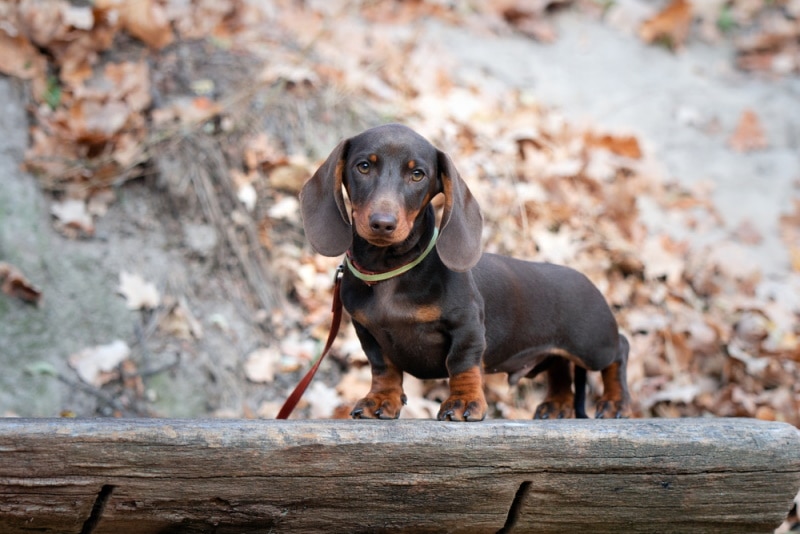Miniature Dachshunds, known for their elongated bodies and short legs, have become beloved by dog enthusiasts all over the globe. Wondering, ‘how big do Mini Dachshunds get?‘ In essence, their distinct physical features can lead to certain health problems, especially if their weight is not carefully monitored. It is crucial for a conscientious owner to understand the specifics of their Mini Dachshund’s size in order to guarantee their well-being and contentment in the long run.

Facts About Mini Dachshunds
Fascinating Facts About Miniature Dachshunds Before we discuss the upper limit of Miniature Dachshunds’ size, let’s uncover some intriguing tidbits about this breed that might catch you off guard.
The Badger Dog
The Miniature Dachshund has a similar background to the Standard Dachshund, but the Miniature version is a newer breed. They originated in Germany around 600 years ago. Their long bodies and small sizes were purposely bred to help them hunt badgers, earning them the nickname “badger dogs.”
Liberty Hounds
Dachshunds, popular in Germany and considered a national symbol, fell out of favor in the United States during World War I. They were rebranded as Liberty Hounds and faced discrimination due to anti-German feelings at that time.
Several Coat Colors and Types
Dachshunds are unique compared to other dog breeds because they can have a diverse range of coat colors and textures, such as short, wire-haired, or long coats in various shades like red, black, chocolate, blue, cream, and tan. This sets them apart from breeds that are limited to specific coat types or colors.

How big do mini dachshunds get ?
The Miniature Dachshund, although part of the same breed as the Standard Dachshund, is noticeably smaller in size when it comes to weight and length. While an adult Standard Dachshund typically weighs between 16 to 32 pounds, a Dachshund is considered Miniature if it weighs 11 pounds or less.
Your puppy’s weight may vary, but here is a general growth chart that shows the average weight and length for this breed. By comparing your Miniature Dachshund’s growth against this chart, you can better evaluate how well your puppy is developing.
Interestingly, some Miniature Dachshunds can give birth to standard-sized Dachshund puppies. Even though it may be disappointing if you were expecting a Miniature, be assured that your puppy will be just as lively and affectionate.

Growth Chart
| Age | Weight Range | Length Range |
|---|---|---|
| Birth | 3.5 – 5.5 ounces (100-160g) | – |
| 1-2 weeks | Doubles birth weight | – |
| 2 weeks | 7-11 ounces (200-320g) | – |
| 3 weeks | 10-15 ounces (280-430g) | – |
| 4 weeks | 12-18 ounces (340-510g) | – |
| 5 weeks | 14-21 ounces (400-600g) | – |
| 6 weeks | 1.5-2.2 pounds (0.7-1 kg) | – |
| 8 weeks | 2-4 pounds (0.9-1.8 kg) | – |
| 3 months | 3-5 pounds (1.4-2.3 kg) | – |
| 4 months | 4-7 pounds (1.8-3.2 kg) | – |
| 6 months | 7-10 pounds (3.2-4.5 kg) | – |
| 12 months (1 year) | 8-11 pounds (3.6-5 kg) | 5-7 inches (13-18 cm) |
Notes:
- The length range (measured from shoulder to tail base) remains consistent at 5-7 inches (13-18 cm) for most of their growth stages, reflecting the standard size for Mini Dachshunds. Length may vary slightly depending on individual differences and breed standards.
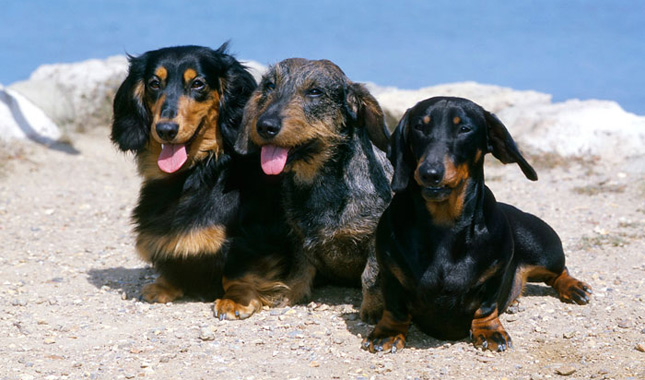
how big do Mini Dachshunds get
Factors affecting mini Dachshund dog size
Genetics
Inherited Characteristics: The size of a Miniature Dachshund is mainly influenced by genetic factors inherited from its parents. If both parents are small, their offspring are likely to be small too. However, there can be variations in size across generations, resulting in individuals that may be larger than expected.
Nutrition
- Diet: Offering a well-rounded and nutritious diet is essential for the proper growth of a Miniature Dachshund. The diet should contain all the necessary nutrients for healthy development.
- Feeding Portion: Adjusting the food portion based on the dog’s size and energy requirements helps prevent overfeeding or underfeeding.

Nutrition
Environment and Care
- Housing: Providing a roomy and secure living space is crucial for the healthy growth of a Miniature Dachshund.
- Medical Care: Consistent medical attention, such as vaccinations, dental hygiene, and overall health evaluations, is essential for the dog’s proper development and reaching its full potential size.
Physical Activity
Engaging in consistent physical activity that matches the dog’s energy levels is essential for preserving muscle tone and overall well-being.
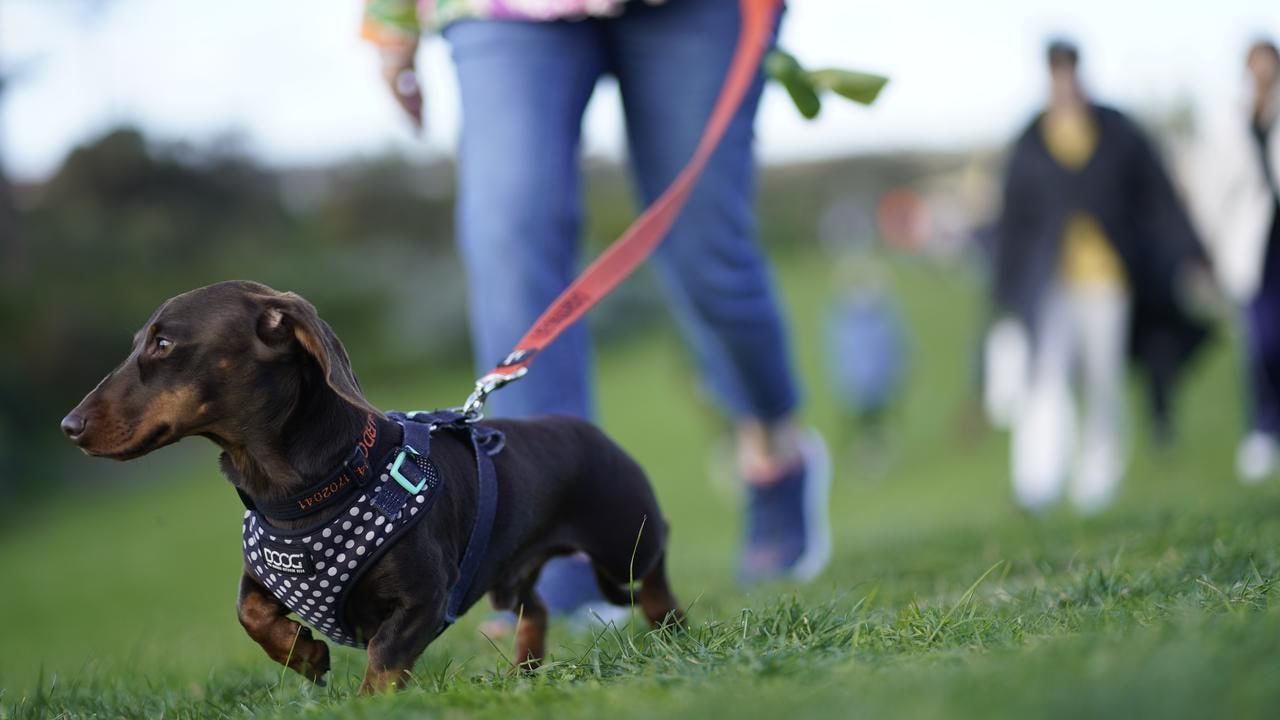
What if my puppy’s weight doesn’t correspond with the weight chart ?
If your puppy’s weight doesn’t match the weight chart, it’s best to see a vet for a thorough check-up. Puppies grow at different rates and may have growth spurts followed by slower periods. A healthy Dachshund puppy fed a good diet should steadily gain weight as they get older. But if your puppy isn’t gaining weight or is losing weight, it’s important to seek veterinary help right away. It’s crucial to address this promptly, as failure to gain weight could indicate a serious health issue.
Health Issues of Dachshunds Related to Weight
Obesity Risk
Dachshunds are prone to becoming overweight if their diet and calorie consumption are not carefully monitored. Obesity can result in severe health problems like heart disease, diabetes, higher risks during surgery, and challenges with mobility.
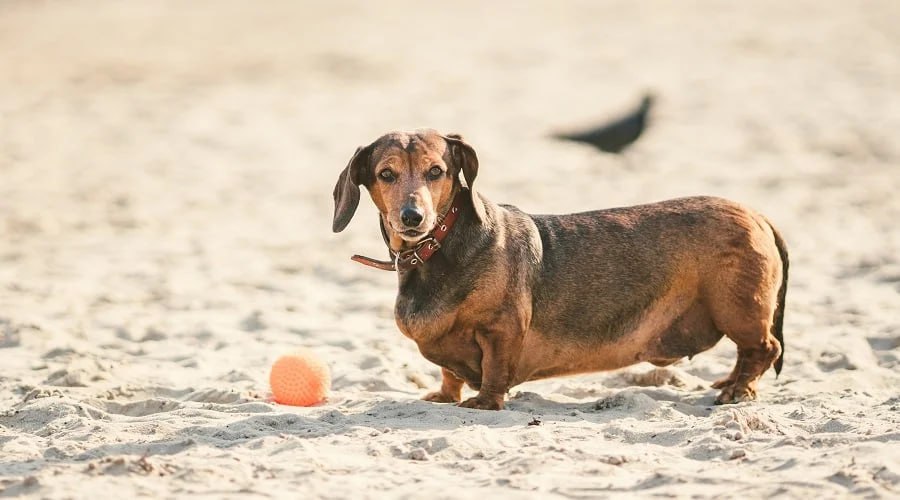
Intervertebral Disc Disease (IVDD)
Intervertebral disc disease (IVDD) is a prevalent problem among Dachshunds, particularly those who are overweight. It pertains to the deterioration or protrusion of spinal discs, leading to discomfort and mobility challenges. The likelihood of this condition occurring is increased in obese Dachshunds.
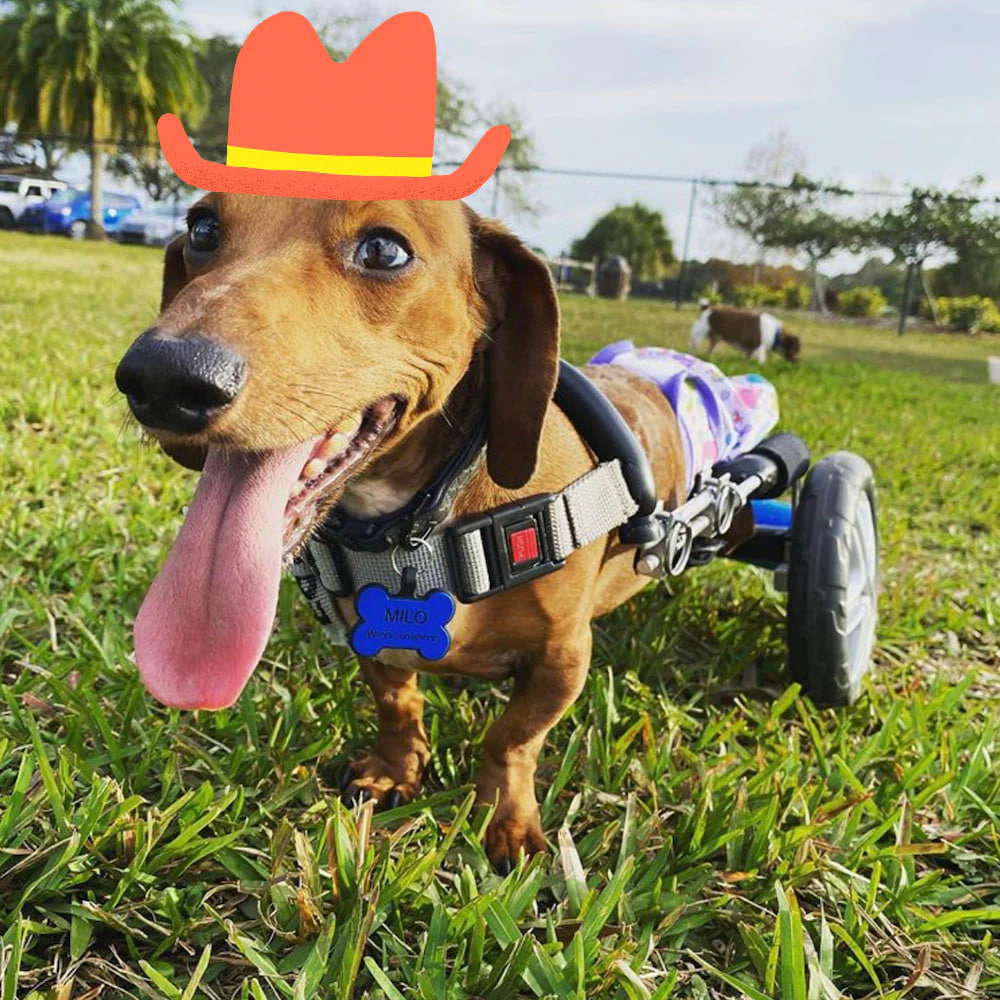
General Concerns
In addition to obesity and IVDD, overweight Dachshunds may experience other weight-related problems such as breathing issues, joint discomfort, and decreased ability to handle certain medical procedures. It is important to keep Dachshunds at a healthy weight and provide proper nutrition to ensure their overall well-being.
Maintaining a Healthy Size and Weight for Your Small Dachshund
Proper Feeding
- Opt for a Premium Diet: Pick a high-quality dog food suitable for small breeds or specially designed for Dachshunds. Make sure it provides the necessary nutrients without too many calories.
- Manage Serving Sizes: Dachshund feeding chart depends largely on age, size, and activity level. Avoid overfeeding and monitor treats to prevent weight gain.
- Steer Clear of Human Food: Resist the temptation to give table scraps or human food to your Dachshund, as it can result in obesity and digestive problems.

Proper Feeding
Exercise Recommendations
- Daily Exercise: Make sure to walk your Dachshund every day to help them stay at a healthy weight and support their heart health. Remember to be cautious of their back, and opt for a harness over a collar to prevent any strain on their neck.
- Interactive Play and Brain Games: Keep your Dachshund entertained and mentally engaged by playing interactive games with them. This can involve playing fetch inside or giving them puzzle toys to solve.
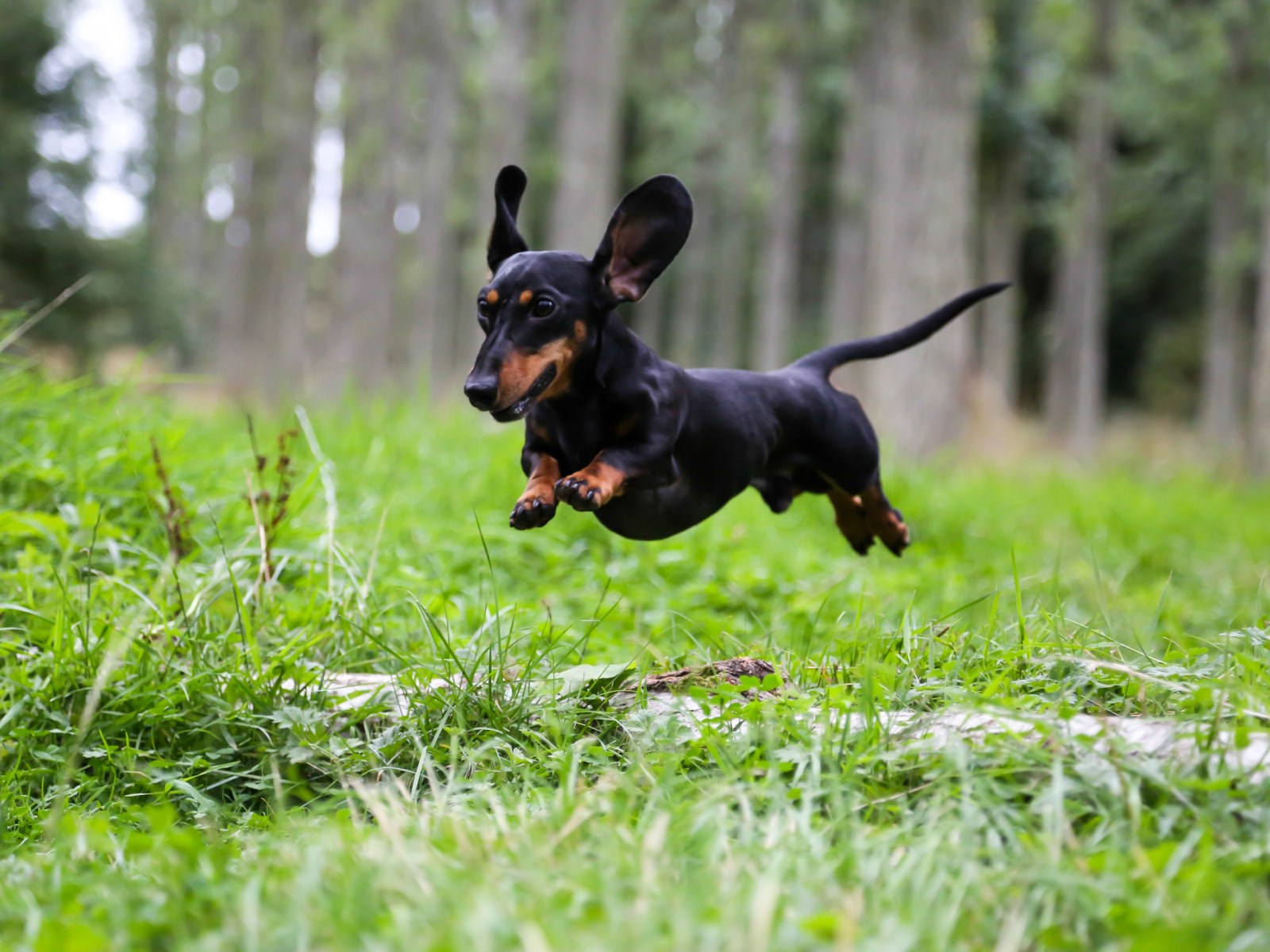
Exercise Recommendations
Regular Veterinary Check-ups
Regularly schedule appointments with your vet to monitor your Dachshund’s weight, overall health, and address any diet or exercise concerns. These check-ups can help detect health issues early, such as obesity-related conditions like IVDD. By following these recommendations for feeding, exercise, and consistent veterinary care, you can help your Dachshund stay at a healthy weight, which will benefit their overall health and lifespan.
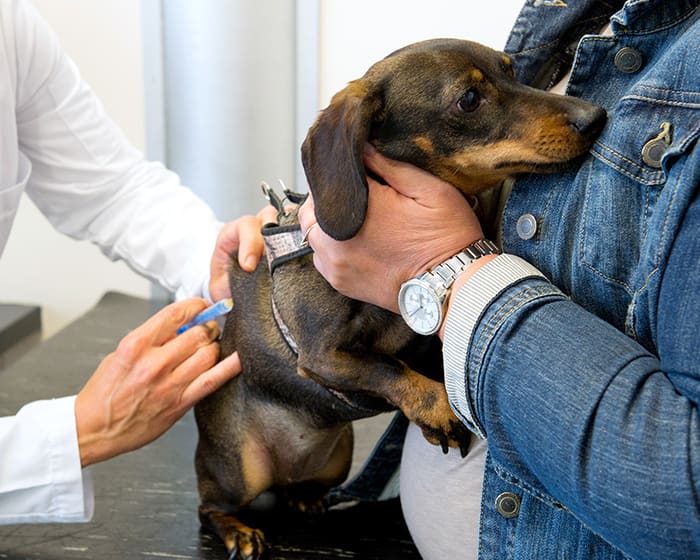
FAQs
Q : What is the average size of a Mini Dachshund?
A Miniature Dachshund usually has a height of 5 to 7 inches (13 to 18 cm) at the shoulder.
Q :How much do dachshunds weigh?
Q : Do Mini Dachshunds come in different sizes?
Certainly! Dachshunds are available in three different coat varieties (smooth, long-haired, and wire-haired) and two sizes (Standard and Miniature). Mini Dachshunds are tinier compared to the Standard ones.
Q : At what age are Mini Dachshunds fully grown?
Mini Dachshunds generally reach their full adult size by approximately 12 months old, but growth may differ among individual dogs.
Q : How does size affect Mini Dachshund’s health?
The size of a dog can impact its health, particularly when it comes to managing weight. It is important for Dachshunds to maintain a healthy weight to avoid problems like back issues, which they are susceptible to because of their long bodies.
Conclusion
In summary, it is important for potential Mini Dachshund owners to know how big do Mini Dachshunds get. Miniature Dachshunds typically reach a height of 5 to 7 inches and weigh between 8 to 11 pounds as adults. Their small size makes them well-suited for living in apartments, but they still need regular exercise and weight management to stay healthy. By providing the right diet, enough physical activity, and regular vet check-ups, owners can ensure their Mini Dachshunds are happy and maintain a healthy size. To learn more about the size of Mini Dachshunds and how to care for them, it’s best to seek advice from a reputable breeder or veterinarian.

